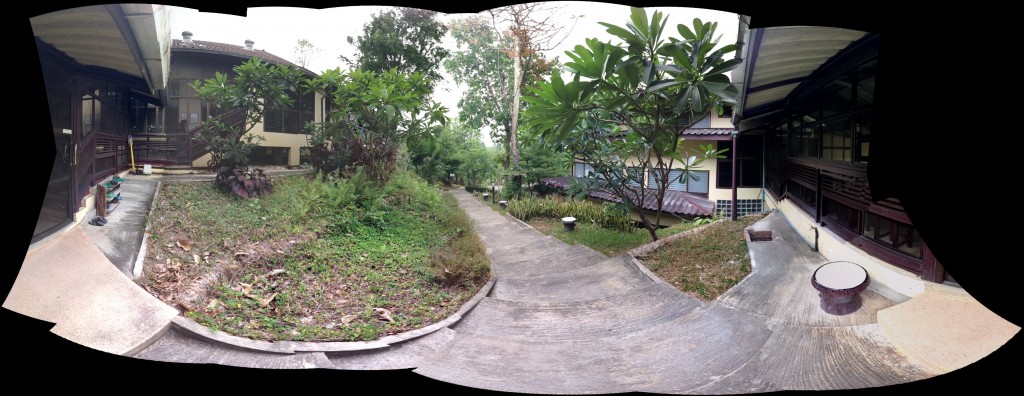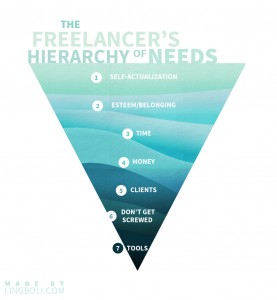Lingbo Li
Fighting Your Way Through
“Nobody tells this to people who are beginners, I wish someone told me. All of us who do creative work, we get into it because we have good taste. But there is this gap. For the first couple years you make stuff, it’s just not that good. It’s trying to be good, it has potential, but it’s not. But your taste, the thing that got you into the game, is still killer. And your taste is why your work disappoints you. A lot of people never get past this phase, they quit. Most people I know who do interesting, creative work went through years of this. We know our work doesn’t have this special thing that we want it to have. We all go through this. And if you are just starting out or you are still in this phase, you gotta know its normal and the most important thing you can do is do a lot of work. It’s gonna take awhile. It’s normal to take awhile. You’ve just gotta fight your way through.”
― Ira Glass
Like an evil wood nymph

A few months ago, Boston photographer Tony Luong contacted me for a photography project on 1st generation Asian Americans. At the end of the shoot – which was a pretty standard portrait of me standing still in front of a tree – I decided I wanted to do some jumping shots for fun. Tony very kindly obliged. I really liked the results, which look oddly like some kind of lo-fi advertisement.



There are also a lot of requisite awkward/random shots… where I do things like check my cell phone and run around like a fool.


Opening Up
“There are two basic motivating forces: fear and love. When we are afraid, we pull back from life. When we are in love, we open to all that life has to offer with passion, excitement, and acceptance. We need to learn to love ourselves first, in all our glory and our imperfections. If we cannot love ourselves, we cannot fully open to our ability to love others or our potential to create. Evolution and all hopes for a better world rest in the fearlessness and open-hearted vision of people who embrace life.”
Vipassana: My 10 Day Silent Meditation Retreat in Thailand
Meditation, like exercise, is one of those things that I’ve always meant to do but constantly put off.
Given my psychological profile – anxious, labile, growth-oriented – meditation has frequently been suggested as way to keep my mental shit in order. I first heard about Vipassana, a ten day silent meditation retreat, from fellow travelers when backpacking through Southeast Asia. People raved about it (“difficult but worth it”), plus it was donation only.
When my friend Rachel suggested island hopping in Thailand, I figured I’d combine it with a Vipassana afterwards. I have never meditated before. I would try, get distracted, and give up. So I really didn’t know what I was getting myself into.
But I’ve learned that’s ok. That’s how we all start. Naked and naive.
——
I picked a center in Kacanaburi, Thailand since it still had slots for women open. I arrived on a coach bus with dozens of other meditators. I sat next to a tall American guy who felt regret about never fulfilling his artistic ambitions. He was turning 40 during the retreat. His friend, Paul, had done a 20 day retreat. Apparently there were also 20, 45, and 60 day retreats. 10 days is just the introductory mini course.
(Everytime I do something perceived as “hardcore”, I mostly realize how there are so many more levels of hardcore that I haven’t yet reached. Run a marathon? There are ultra marathons. Ultramarathons in the desert. You haven’t even done an Ironman. Backpack for 4 months? Pshaw, that kiwi chick has been traveling for 5 years in politically unstable regions. This French dude has hitchhiked through Tasmania and couch surfed for 3 years straight. He asked random people in the train station to house him. There’s always someone more hardcore than you.)
We surrendered cellphones, computers, books, and any valuables on the first day. We weren’t allowed to talk, make gestures or eye contact, exercise, read, write, or listen to music. Men and women were separated. No touching – even non-sexual – between people of any gender was allowed. We each slept in (surprisingly nice) private rooms.
For 10 hours a day, we meditated. From 4:30, to 6:30am. From 8 to 11am. From 1 to 5pm. From 6 to 7pm. From 8:30 until 9pm. And then we slept.
Meditating 10 hours a day still left 4.5 hours of free time to fill. With no talking, reading, writing, or exercising, that left only cleaning my room, grooming, or walking within the course boundaries. After lunch, I’d walk in slow circles around the garden and pause to watch the traffic of harvest ants on electrical wires. I exfoliated my face until it shined. I took newfound pleasure in mundane tasks like washing my underwear and making the bed.
My mind desperately wanted to plan. I found it comforting to make decisions about changes to make back in Boston. Sublet out my apartment. Start X or Y project. Revamp my business. Email my friend Spencer. Change my flights and get home earlier.
The last one filled my mind for hours of meditation practice. I really missed my boyfriend, and a Vipassana gives you no outlet or distraction. Being inside my mind for all my waking hours, without outlet or distraction, felt like living inside an echo chamber.
——–
Goenka, the teacher whose voice we listened to on recordings, explained Vipassana as a scientific inquiry into the changing nature of our mind and body. The ultimate goal was be free of “mental defilements” – things like anger and jealousy that keep us from being happy. Rather than trying to suppress or distract oneself, you observe sensations in the body. Emotions, then, are reactions to pleasant and unpleasant bodily sensations. If we learn to be equanimous with those sensations, we can learn to recognize and observe the emotion (“Oh look! My heart is beating faster and my face feels warm.”) rather than letting it control us.
During Vipassana style meditation, you observe sensations from the top of your head to the tip of your toes, then in reverse. Whether pleasant or unpleasant, you maintain a detached, peaceful state, observing and remembering the transient nature of those sensations.
I meditated wrong for 6 days. You’re not supposed to visualize anything, but I kept imagining a particularly intense itch on my upper lip as Sebastien from The Little Mermaid doing a jig. It kept me amused through very long hours.
——–
I had the most vivid dreams.
In one dream, I was having lunch with a client. He was eating french onion soup.
Try a bite, he said. The continuity slipped, and I swallowed a spoonful of seafood.
Several dreams were seemed to be about travel logistics anxiety. I was trying to book flights on AirAsia to imaginary airports in China, or reading imaginary subway maps of imaginary cities. I kept backtracking or missing my stop.
One dream inexplicably combined interior decoration with killing off a horde of zombies. In that surreal dreamverse, I was floating 5 feet above a stream, pouring a jug of kerosene on a floating barge of the undead. I had just picked out an upholstered chair with my zombie-killing compatriot.
I have no idea what that one was about.
——–

On day 6 of the silent meditation retreat, the shower in my cottage emitted nothing but a hissing gurgle. At lunch, there was a polite, handwritten sign on the table that read, “Due to severe water crisis, please shower 1 time a day.”
I had been showering 3 times a day. I brushed my teeth 4 times a day. There was nothing else to do.
My immediate instinct was to fill up my water bottle in the dining hall.
“No water?” I asked one the Dhamma volunteers. (You are allowed functional speaking with the workers, and to ask the teacher questions twice a day.)
She laughed and said, no water. But they had 20 bottles of drinking in the back.
Big jugs?
No, small bottles. For 70 of us.
We’re going to die! I joked. It was the first time I’d made a joke or laughed out loud, however quietly, in a week. She assured me that someone would go to town and buying drinking water if we ran out.
When I tried to brush my teeth after lunch, only air came out of my tap. I could hear my neighbor make out with some wheezier gurgles. That night, I gave myself a sponge bath with a wadded-up t-shirt, bucket of cold water, and a water bottle.
Finally, on the afternoon of Day 9, a rumble of thunder broke through. By break time, a few drops of rain started to fall. I hurried back to the meditation hall with an umbrella. Then the sky broke open. Fruit was flung from the trees. The shutters screeched and a glass window shingle shattered. We all stared with silent wonder outside, sitting on our meditation mats. I imagined all the windows blowing out and spewing broken glass inwards.
Some students went to close the windows. The teacher, a monk, sat cross-legged and serene as ever.
Then Goenka’s voice began chanting on the sound system. “Start again,” he intoned, drawing out the “again” with dramatic flair. “Start again.”
With my eyes closed, I heard the brush clink of glass swept and screws sorted. The rain had stopped. I began sweeping my body for sensations. Remember the law of nature – anicca, Goenka was saying. Impermanence.
This too shall pass.
——-
Day 2, 4, and 6 were hell. I entertained the idea of leaving. The days felt sweaty, claustrophobic, interminable. I was sitting in rooms without air conditioning, in the middle of Thailand’s hot season, while trying to focus exclusively on nostril sensations for 10 hours a day. Scintillating.
I spent meditation time guessing how much it would cost to change my return flight. I imagined different surprise-arrival-in-Boston scenarios, which felt a lot more pleasant than trying not to scratch the itch on my foot while observing the subtle, prickly sensations on my upper arms. Meditation seemed so pointless, and some of Goenka’s videotaped talks seemed more like trite secondhand testimonials than actual advice.
Something changed on day 7. The videotaped talk that night was about mastering the mind. This spoke me a lot more than his talks about morality, about how Vipassana wasn’t a religion, or assorted Buddha parables. This was why I was here: to be master of my own mind.
There were only two more days left until I got my phone back, and I suddenly felt urgency to make the most of my time left.
I noticed myself making progress: I no longer beat myself up about not being the perfect meditator. When I noticed my attention wandering, I gently redirected it back to my bodily sensations without name calling or disappointment. Sometimes, if meditation felt impossible, I gave myself tiny goals to accomplish: just two passthroughs of the body. Ok, now five. Good job!
I began to come out of hour-long meditation sessions feeling incredibly… good. Very calm. Appreciative of little things around me. I spent a half-hour of one break time staring at a leaf, admiring how beautiful it was. It wasn’t like there was anything else to do, anyway.
I even let myself feel good about overcoming the negative self-talk hurdle.
——-
The hard part of Vipassana isn’t the silence part. Silence makes perfect sense. It is trying to focus your attention for 10 hours a day. It is the loneliness of your mind, and dealing with all the neuroses and shit that float to the surface when you are isolated from civilization for two weeks.
For me, I kept thinking about random ways that I had let people down. It didn’t how tiny and insignificant the incident was, or if it had happened 5 years ago with a person who probably didn’t remember my name. I’d be meditating, and the thought would pop up, uninvited. It felt like psychological whack-a-mole.
I finally went in to see the teacher on day 7. He spoke through an interpreter.
When I meditate, anxieties and mistakes I’ve made keep coming up. Should I ignore them, or try to reason them out? I asked.
Just focus on your sensation. This is happening for everybody, he said.
After this course, when these thoughts come up, should I still only focus on the sensation? There are some that I can’t do anything about, and some that I can – like if I’ve forgotten something.
The monk smiled. I can’t tell you what to do. Only you know what to do. You can’t plan for the future. Just focus on the present and doing your Vipassana. Focus on your sensations.
You know, I liked that answer. It appealed to my autonomy.
——-
I have terrible eczema. It’s a chronic skin condition that results in dry, itchy patches. During the retreat, it shrank into nothingness. I marveled at how smooth my arms and legs looked.
Within literally hours of leaving the retreat, I noticed itchy areas reappearing on my arms. I’d never seen clearer evidence that it was psychosomatic.
——-
For 10 days, I counted down the hours to getting my phone back. On day 9, I thought, wow, I really needed these entire 10 days. Every single day.
We got our belongings back on the morning of day 10. By that time, I dreaded it.
Within the hour, I was a mess. I realized I had forgotten to file my taxes for the year. I was over my international data plan limit. The United Airlines website wasn’t letting me change my flight. I lay on my bed, fumbling with my phone and sweating in the heat. I waited for the “I missed you, too.” When I finally got it, I cried a few tears of relief, mingled with disappointment for wanting it.
I felt very, very far away from Nirvana.
I switched on the fan and lay down, hearing the chatter of voices outside. I heard Goenka’s voice in my mind: focus on respiration… focus on sensation…
And so I did.
——-
A week and a half later, I’m writing from Chiang Mai, a city in northern Thailand popular with expats.
Turned out, changing my 3-leg journey home would have cost nearly $900, so I ended up staying. My time in Chiang Mai has been mixed. The city itself is lovely, but the people I was visiting seemed less than thrilled that I was in town. While rationally, I know they’re inconsequential, that snubbing unearthed an old wound.
My old mental habit would be to yell at myself for feeling upset at all. “This is dumb! You shouldn’t feel upset! You’re too good for this! Go hang out with those other cool people!”
Trouble is, that thinking didn’t get me anywhere. It just makes me meta-upset that I’m still upset. Instead, in the spirit of Vipassana, I’ve been trying to confront my disappointment and observe it, rather than suppressing it. It’s natural to feel a bit upset. It’s ok. This too shall pass.
One of the hardest things to learn is empathy for yourself. It’s something I do for others all the time, but rarely do I turn it inwards.
So I’ll add my testimonial: difficult, but worth it. Really difficult, but definitely worth it. It’s hard to perceive your mental patterns. It’s harder to change them. This is one way.
——
To learn more, go to http://dhamma.org.
How Not to Get Screwed (How to Freelance and Travel the World: Part 3)

Welcome to part 3 of How to Freelance and Travel the World!
So you’ve self-actualized. You understand what you’re getting into. You’ve priced yourself. You’ve found clients.
And you thought you did all the hard stuff.
Well, actually. The hardest part of freelancing – harder than any of that other stuff – is client management.
Client management is roughly: 1) Making sure a client is happy balanced with 2) Not getting screwed.
Like in any healthy relationship, you have to set up expectations and boundaries. Let me explain.
![]()
Don’t Get Screwed.
Look, I’ve gotten screwed. It isn’t fun. It’s important to separate out two undesirable situations:
- The expectations weren’t clear, so you are working too much / the client is constantly unsatisfied.
- The client is a total, unreasonable asshole and should be fired.
It may be some combination of both. But in any case, you can’t control the second, so focus on situation #1.
My worst client story happened very early on. It was my second month in business, and working with a friend, pitched a local company on redesigning their website. The red flags started immediately: their last designer was apparently inadequate (“too templated”) and they wanted us to put put together a proposal with a mockup of their homepage, doing a half hour pitch, then another proposal against another company. (If it’s a reputable client with a huge budget, this might make sense, but this was a simple business website.) I put in some late nights while still taking college classes and got the gig.
Then the client called to haggle me down on the price listed in the proposal, line by line. I put together wireframes, which they okayed, then moved into mockups after reviewing several websites they liked.
Then started the infuriating Skype calls where the client would express disappointment, say my work was inadequate, and make suggestions like, “Maybe we could make the navigation green and wavy, with a gradient underneath,” and want to see comps with all of their ridiculous ideas implemented. When it inevitably looked terrible, the whole process would start again.
There were a series of phone calls where they’d say that I wasn’t being proactive enough, or not technically capable enough, or whatever. I tried starting from scratch. They still weren’t happy. In the project proposal, I had written they were allowed 3 rounds of revisions for the mockups (a good practice, and something you should spec out), which I started to cite as the revisions became endless. But when I attempted to actually hold to that, they accused me of being unreasonable.
I wish, dear reader, that I fired them then. But the sad tale slogged out for a few more fruitless weeks, during which I was utterly miserable, compounded by senior spring and a failing personal relationship. I’m happy to say I’ve never had an experience quite as horrible again, but there are a few things you can do to ensure this doesn’t happen to you.
- Write a clear statement of work, that outlines exactly what features or pages you’ll build and what is and isn’t included. Write down how many revisions they’re allowed, and how much they will be charged if they exceed the scope. You can also have a legal contract (see tools), but honestly, for small, short projects you’ll just scare people off unnecessarily – just make expectations clear and have them sign off on it.
- Get money upfront. See the 3 Rules of money in the previous post. DO NOT continue working if the client is being difficult about the deposit check. I’ll do some initial work, but if they continue being difficult, stop working and chase them down.
- For larger projects: break up projects into stages and make sure clients sign off at each stage before proceeding to the next.
- Write down your workflow so they know how to work with you. (Ex. A call, then wireframes, then mockups, etc.)
- Recognize when a client is being unreasonable, and try to figure out what they’re angry about – sometimes they just want more attention, or better communication. If that keeps failing, cite the work agreement. If that fails, balance the likelihood of project completion with the negative effect on mental health. A job is a job, and you should do your best to make a client happy – but if it just ain’t working out, maybe it’s time to breakup and learn from the experience.
Freelancing has the odd effect of dumping piles of cash into your hands before Uncle Sam has taken his chunk. Do not be fooled.
My personal formula, imperfectly applied, is to live on 50% of your income, leaving roughly 30% for taxes and 20% for savings. But really, just spend as little as possible. De-shackle yourself from stupid crap that fills up your closet, kitchen appliances you’ll never use, and chairs that don’t get sat in. Hold off on a potential purchase until you find yourself thinking, “Man, I could really use a ___ right now.” (For me: tea kettle, microplane, mirror, black boots)
I’m not a monk. I live alone in a nice part of Boston; I buy designer makeup; I eat out frequently. But all the crap I bought in the few months after I started making real money I regret – the dress I only wore once, the jewelry sitting in a bin somewhere. I don’t regret, however, the money I’ve spent on travel and visiting friends, and am grateful that I have a job where I can take 4 day weekends or work remotely for a month.
I will refrain from giving further tax or financial advice here, but read up on the basics. (Here’s one basic thing know: you’ll fill out a w-9 form for clients, who will then send you a 1099 form before tax time with how much they’ve paid you that year.) Build up an emergency fund with 3-6 months of living expenses. (I’d recommend six.) Track your expenses with Mint.com (also a good way to track your variable income!). You can also tag business expenses in there. I use Harvest for invoicing, tracking who’s paid me, and also time tracking. You can do the same thing with Google Docs and spreadsheets, but I like that it saves me time.
Finally, it’s ok if you have no idea what the fuck you’re doing. Everyone begins at this point. We all start off not having walked before. At some point, we get scared that we’re about to do something new. Imagine a little kid complaining, “I’ve never walked before! I tried once and I fell! Fuck this walking stuff, I’ll be in my stroller.” It’d be ridiculous. Try to view your fear in this way
Realize that even the most successful people still have moments of fear and self-doubt. Try it: ask someone you look up to if they still get scared. I promise you, unless they’re a total sociopath or liar, they will say yes.
Your fear is not a sign of your inadequacy. It’s part of being human. It will always be there, no matter how much money you make or title you have. Being scared is healthy – it’s to prevent you from doing stupid things like jumping out of an airplane without a parachute. Just don’t let it prevent you from the good.




